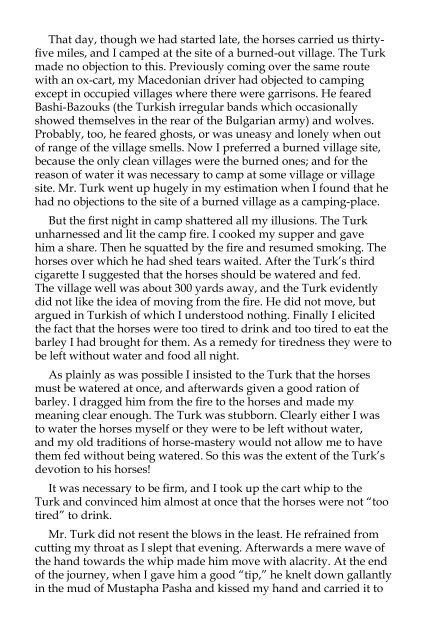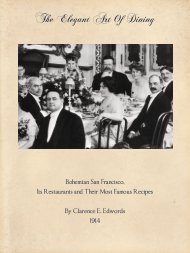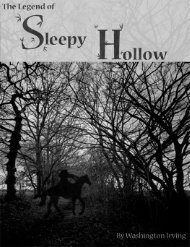Bulgaria e-book - iMedia
Bulgaria e-book - iMedia
Bulgaria e-book - iMedia
Create successful ePaper yourself
Turn your PDF publications into a flip-book with our unique Google optimized e-Paper software.
That day, though we had started late, the horses carried us thirtyfive<br />
miles, and I camped at the site of a burned-out village. The Turk<br />
made no objection to this. Previously coming over the same route<br />
with an ox-cart, my Macedonian driver had objected to camping<br />
except in occupied villages where there were garrisons. He feared<br />
Bashi-Bazouks (the Turkish irregular bands which occasionally<br />
showed themselves in the rear of the <strong>Bulgaria</strong>n army) and wolves.<br />
Probably, too, he feared ghosts, or was uneasy and lonely when out<br />
of range of the village smells. Now I preferred a burned village site,<br />
because the only clean villages were the burned ones; and for the<br />
reason of water it was necessary to camp at some village or village<br />
site. Mr. Turk went up hugely in my estimation when I found that he<br />
had no objections to the site of a burned village as a camping-place.<br />
But the first night in camp shattered all my illusions. The Turk<br />
unharnessed and lit the camp fire. I cooked my supper and gave<br />
him a share. Then he squatted by the fire and resumed smoking. The<br />
horses over which he had shed tears waited. After the Turk’s third<br />
cigarette I suggested that the horses should be watered and fed.<br />
The village well was about 300 yards away, and the Turk evidently<br />
did not like the idea of moving from the fire. He did not move, but<br />
argued in Turkish of which I understood nothing. Finally I elicited<br />
the fact that the horses were too tired to drink and too tired to eat the<br />
barley I had brought for them. As a remedy for tiredness they were to<br />
be left without water and food all night.<br />
As plainly as was possible I insisted to the Turk that the horses<br />
must be watered at once, and afterwards given a good ration of<br />
barley. I dragged him from the fire to the horses and made my<br />
meaning clear enough. The Turk was stubborn. Clearly either I was<br />
to water the horses myself or they were to be left without water,<br />
and my old traditions of horse-mastery would not allow me to have<br />
them fed without being watered. So this was the extent of the Turk’s<br />
devotion to his horses!<br />
It was necessary to be firm, and I took up the cart whip to the<br />
Turk and convinced him almost at once that the horses were not “too<br />
tired” to drink.<br />
Mr. Turk did not resent the blows in the least. He refrained from<br />
cutting my throat as I slept that evening. Afterwards a mere wave of<br />
the hand towards the whip made him move with alacrity. At the end<br />
of the journey, when I gave him a good “tip,” he knelt down gallantly<br />
in the mud of Mustapha Pasha and kissed my hand and carried it to<br />
his forehead.<br />
So faded away my last hope of meeting the Terrible Turk of<br />
tradition in the Balkans. Perhaps he exists still in Asia Minor. As<br />
I saw the Turk in <strong>Bulgaria</strong> and in European Turkey, he was a dull<br />
monogamic person with no fiery pride, no picturesque devilry, but a<br />
great passion for sweetmeats—not merely his own “Turkish Delight,”<br />
but all kinds of lollipops: his shops were full of Scotch and English<br />
confectionery.<br />
But the <strong>Bulgaria</strong>n, not the Turk, is our theme. This introduction,<br />
however, will make it plain that, as the result of a direct knowledge<br />
of the Balkans, during some months in which I had the opportunity<br />
of sharing in <strong>Bulgaria</strong>n peasant life, I came to the admiration I have<br />
now for the <strong>Bulgaria</strong>n people in spite of a preliminary prejudice. And<br />
this conversion of view was not the result of becoming involved in<br />
some passionate political attitude regarding Balkan affairs. I am not<br />
now prepared to take up the view of the fanatic Bulgar-worshippers<br />
who must not only exalt the <strong>Bulgaria</strong>n nation as a modern Chosen<br />
People, but must represent Servian, Greek, and Turk as malignant<br />
and devilish in order to throw up in the highest light their ideas of<br />
<strong>Bulgaria</strong>n saintliness.<br />
The Balkans are apt to have strange effects on the traveller.<br />
Perhaps it is the blood-mist that hangs always over the Balkan plains<br />
and glens which gets into the head and intoxicates one: perhaps<br />
it is the call to the wild in us from the primitive human nature of<br />
the Balkan peoples. Whatever the reason, it is a common thing for<br />
the unemotional English traveller to go to the Balkans as a tourist<br />
and return as a passionate enthusiast for some Balkan Peninsula<br />
nationality. He becomes, perhaps, a pro-Turk, and thereafter will<br />
argue with fierceness that the Turk is the only man who leads an<br />
idyllic life in Europe to-day, and that the way to human regeneration<br />
is through a conversion to Turkishness. He fills his house with<br />
Turkish visitors and writes letters to the papers pointing out the<br />
savagery we show in the “Turk’s Head” competition for our cavalrymen<br />
at military tournaments. Or he may become a pro-Bulgar with a<br />
taste for the company of highly flavoured Macedonian revolutionary<br />
priests and a grisly habit of turning the conversation to the subject<br />
of outrage and massacre. To become a pro-Servian is not a common<br />
fashion, but pro-Albanians and pro-Montenegrins and Philhellenists<br />
are common enough.<br />
The word “crank,” if it can be read in a kindly sense and stripped





